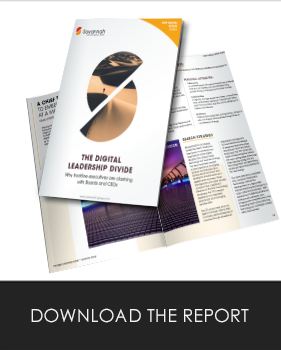 Research across over 400 senior executives shows a substantial “digital divide” between the Board/CEO and the corporate functions (Technology/Digital/ Finance/HR/Marketing/Sales) in understanding the talent and skills required to enable and embed digital transformation within the UK’s largest businesses.
Research across over 400 senior executives shows a substantial “digital divide” between the Board/CEO and the corporate functions (Technology/Digital/ Finance/HR/Marketing/Sales) in understanding the talent and skills required to enable and embed digital transformation within the UK’s largest businesses.
The study sought to understand whether executives felt their business was:
- Adapting to the digital age in terms of their workforce and culture,
- Had the necessary digital skills and competencies in the leadership team,
- Had reframed the type of talent required in the organisation and,
- Whether they were winning the talent war against their competitors.
In each case, corporate functions were far less confident about the organisation’s progress than the Board/CEO. A significant proportion of corporate functions “strongly disagreed” that the progress required is being made.
Shared understanding through open communication at a senior leadership level is a critical factor in navigating effective change.
Developing or acquiring leaders with skills in collaboration, strategic thinking and influencing helps promote the exchange of knowledge and information across the board and senior leadership team. This subsequently cascades down into the rest of the organisation to create a culture and environment well suited to digital change.
Is Your Leadership Team On The Same Page?
When it comes to digital transformation, much of the conversation focuses on strategy, systems, products and services, culture and processes with the goal of providing suggestions for what businesses should do in order to stay ahead of the curve. While consideration of those areas is clearly important there is an elephant in the room, or rather, the boardroom – a lack of a shared understanding about the talent and skills required to accelerate digital transition.
Any successful transformation programme is driven by people, not by technology or processes as highlighted by research from Google and Temporall. 71% of the C-Suite cite that the workforce is extremely important in supporting the digital transformation strategy and this cannot be done in a siloed way. Digital transformation can be a distraction for this reason however with many executives classifying ‘digital’ as owned by the technology side of the businesses and therefore not something they need to concern themselves with. In addition, the hype that technological breakthroughs get – chat bots, AI, the Internet of Things – distract further. Regardless of the type of transformation, the talent sourced from within the organisation and supplemented from outside the organisation will make or break a business’s successful transition to their digital future.
As a people business, we are always curious about leadership attitudes and views towards talent and skillsets within businesses. Our research study of over 400 senior executives found a divide between responses from the Board (CEOs, Chairman and NonExecutive Directors) and senior leaders in functions on the frontline of digital transformation including IT, HR, Finance and Digital about the current talent and skills capability within their organisation and future capabilities required. The CEO/Board tended to be overly optimistic about current people capabilities and digital adaption of the workforce whereas the frontline corporate functions tended to be more pessimistic about progress so far against what they saw as the talent and mindsets required to succeed.




